Determining the ranking difficulty of a keyword will help you understand how hard it would be to rank high in Google for your target keywords. When it comes to ranking in Google, you need to understand who you would be up against before you target a keyword; otherwise, you could be entering a battle you won’t be able to win.
From an SEO perspective, competitors are pages in the website that rank at the top of Google for your target keywords. So that means that your competitors can be different for every single keyword you target. So there are three main things you are going to consider before you decide to pick a fight.
Three things you are going to consider
-
Search intent
-
Metrics of the top-ranking pages and websites
-
Topical authority of the top ranking websites
Now, as we go through these points, we will create a list of self-check questions that would help you make informed decisions in your keyword targeting. Also, in other to see things like metrics of top-ranking pages, you need an SEO tool since Google won’t show you data on other pages. There are lots of great SEO tools out there to help you do this, but as a beginner, if you do not have any, you can search and use any of the free ones as well. I will be using the Ahrefs free SERP checker tool for this lesson. So let’s get started
-
SEARCH INTENT
The first thing you need to do is look at the SERP for the keyword you want to target, for example, “best iPhone charger,” and ask yourself this question
Do some of the top-ranking pages fail to closely march search intent? To find the solution to this question, you can go through the three C’s of search intent which are
-
Content-type
-
Content angle
-
Content format
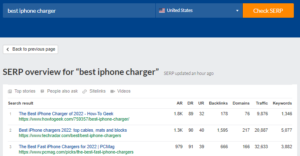
And by the looks of it, they are all listicle blog posts using the freshness angle, so they do match it. Also, pay close attention to the titles and URLs of the top-ranking pages. In general, if the top pages include the primary keyword or a variation of it in the title and/or URL, they are likely targeting that keyword. For example, all the top-ranking pages for the query “best running shoe for children” are precisely about the keyword.
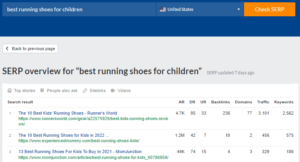
Whereas; a query like “best keto diet” is a bit mixed. As you can see, some pages have explicitly gone with the angle “A keto diet meal plan and menu” as a result, it’s probably matching the searcher’s intent better than the more narrow post about the best keto diet for beginners.
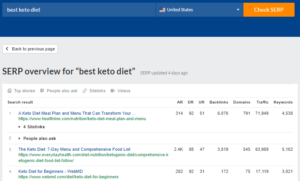
This is a sign of weakness in the SERP because it means there is probably a lack of rank quality content out there about the broad topic best keto diet. Now I don’t want you to take this as an advice that you must include the exact keyword phrase in your titles and/or URLs with this example; finding the best keto diet is actually a very broad need for a specific person.
-
METRICS OF THE TOP-RANKING PAGES AND WEBSITES
The first metric to look at is the number of websites that are linking to the page; this is popularly known as referring domains. As we already know, backlinks are one of Google’s most prominent ranking signals.

So if a page has a lot of quality links pointing at it, then it would be more competitive to rank. So before choosing a keyword, you need to ask yourself – can I get more quality backlinks than the top-ranking pages?
The attributes of quality backlinks are
-
The relevance of the link to the content it is linking to
-
The trustworthiness of the linking website
-
Quality backlinks drive traffic
-
Authority of the linking domain
-
The Uniqueness of the link
-
Non-reciprocal links
-
Social media signals
The second metric to look at is Website Authority also known as domain rating (DR). It represents the overall strength of a website’s backlink profile. Generally speaking, you should be going after keywords when your website’s domain rating is in a similar ballpark range as the top-ranking pages. Or, at the very least, one of the top-ranking pages should be in the same range as your website.

For example, if all the websites that rank in the top ten have high domain ratings of about 87, 83, 93, 88, and you have a domain rating of, let’s say, 20, then you may like to consider competing when you are at that similar level. So let’s add that question to our checklist – is my website in a similar domain rating range or higher than the top ranking websites? Again this is a very general recommendation but still a decent one to follow if you are a beginner at SEO. To see the domain rating of your own site, you can enter your domain into any SEO tool and see it there on the overview page, or you can enter your domain on the Ahrefs free website authority checker.
-
TOPICAL AUTHORITY OF THE TOP RANKING WEBSITES
The third thing you need to consider is the topical authority of the top-ranking websites. Google wants to rank pages from authoritative sources, and this goes beyond backlinks. For example, if we look at the SERP for “best running shoes for children,” you will see that this site with a domain rating of 42 is outranking much a more powerful website with significantly more referring domains.
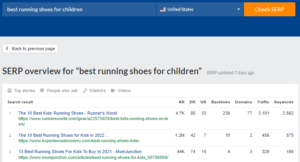
So, the question you need to ask yourself is this: Is my website equally or more topically authoritative than the top ranking websites? If the answer is yes, then that is a positive thing for you. The easiest and quickest way to find out is to just look at the domain names and use some common sense. For example, looking at the SERP for the query “gym machines for weight loss,” you will see sites like besthealthmag.ca, fitbod.me, and snapfitness.com that talk about workouts and fitness.
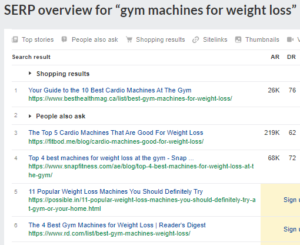
And for domains that aren’t as easily distinguishable like possible.in and rd.com, you can just visit the site, hit the about page, and get a general idea of what the site is about. In the case of possible.in you will see that they talked about weight loss machines because they have a weight loss blog, so yes, it is topically authoritative on weight loss.
Let’s look at a full list of yes or no questions as a very general rule of thumb; The more yeses you can get, the better your chances of ranking. This is very general because SEO is quite nuanced. Let’s go through a set of hypothetical examples for a fitness site. To set a scene, let’s say you have a website that is about gym instruction, and you also review gym equipment, and your website’s domain rating is low and around 20.

The first example is for the query “abs training machines.” Let’s go to the questions
- Do some of the top-ranking pages fail to closely match search intent? From the looks of it, they all look decent, so check the no box.
- Can I get more quality backlinks than the top-ranking pages? No.
- Is my website in a similar domain rating range or higher than the top ranking websites? No.
- Is my website equally or more topically authoritative than the top ranking websites? Well, two out of three of the top pages are from fitness sites, and so is mine so let’s give this a yes as well.
Now it looks like we have a tie between yeses and no’s, and this is exactly why I said – as a very general rule of thumb, the more yeses you can check off, the better your chances of ranking.
The next analysis is for the keyword “best home treadmills.”
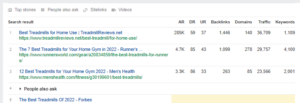
- Do some of the top-ranking pages fail to closely match search intent? Looking at search intent, overall, it looks like the majority of pages are good, so I will check the no box.
- Can I get more quality backlinks than the top-ranking pages? Again, just looking at the number of links to these pages, the answer would be a no, seeing as we are looking at about tens to thousands of referring domains. It is important to realize that getting more links than the first two pages probably won’t happen in the near future, meaning getting the top-ranking spot will be tough.
- Is my website in a similar domain rating (DR) range or higher than the top ranking websites? The answer is no.
- Is my website equally or more topically authoritative than the top ranking websites? My website is topically authoritative, so the answer to the final question is a yes.
So based on our analysis, it looks like this will not be a topic really worth going after. Remember the general rule of thumb, which states that the more yeses you can check off, the better your chances of ranking. Again, SEO is nuanced first; you need to weigh out some of the other principles we discussed, like Traffic potential and Business value. And the best way to make sound judgment calls is through experience. So it will take time to hone your skills and gain a better grasp of keyword analysis. So as you can see, understanding how hard it would be to rank in Google will be a crucial skill to your success in search. This is because it’s the first step to getting predictable results. After all, if you know what it would take to rank ahead of your competition, then it all comes down to execution.




Good blog you’ve got here. It’s difficult to find high quality writing like yours these days.
I seriously appreciate people like you! Take care!!